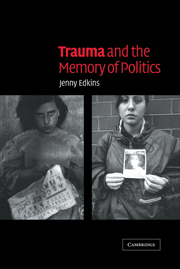Book contents
- Frontmatter
- Contents
- List of illustrations
- Preface
- 1 Introduction: trauma, violence and political community
- 2 Survivor memories and the diagnosis of trauma: the Great War and Vietnam
- 3 War memorials and remembrance: the London Cenotaph and the Vietnam Wall
- 4 Concentration camp memorials and museums: Dachau and the US Holocaust Memorial Museum
- 5 Testimony and sovereign power after Auschwitz: Holocaust witness and Kosovo refugees
- 6 Conclusion: the return of the political – the memory of politics
- Bibliography
- Index
Preface
Published online by Cambridge University Press: 05 October 2013
- Frontmatter
- Contents
- List of illustrations
- Preface
- 1 Introduction: trauma, violence and political community
- 2 Survivor memories and the diagnosis of trauma: the Great War and Vietnam
- 3 War memorials and remembrance: the London Cenotaph and the Vietnam Wall
- 4 Concentration camp memorials and museums: Dachau and the US Holocaust Memorial Museum
- 5 Testimony and sovereign power after Auschwitz: Holocaust witness and Kosovo refugees
- 6 Conclusion: the return of the political – the memory of politics
- Bibliography
- Index
Summary
This book was prompted by a curiosity about how what we call ‘politics’ draws on a particular linear notion of time. Thinking about time and politics led me to explore what have become two growth areas of recent scholarship in a range of academic fields – history, anthropology, cultural studies and psychoanalysis – questions of trauma and memory. At the beginning of the new century it appears that a large number of people are interested in how, to what purposes and with what effects, we memorialise the traumatic events of the twentieth century. Places such as Flanders, Auschwitz, Hiroshima and Vietnam all hold our attention now not only as events, but in relation to the question of memory. And following the events of September 11, 2001 in New York and Washington this interest in trauma and memory has intensified and become more personal for many. Two things are recognised. First, from work on trauma it is acknowledged that memories such as these are distinct – traumatic memory is not the same as everyday memory. Second, from work on collective or cultural memory it is argued that many contemporary forms of memorialisation function to reinforce the idea of the nation. What I do in this study is put these two understandings together and explore what they imply in political terms. It has already been argued that memorialisation often constitutes a form of forgetting.
- Type
- Chapter
- Information
- Trauma and the Memory of Politics , pp. xiii - xviiiPublisher: Cambridge University PressPrint publication year: 2003

